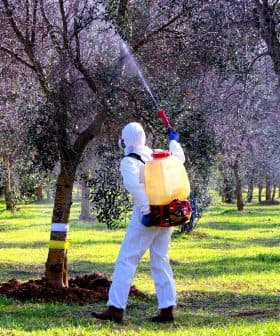Organic Foods Key to Mediterranean Diet Health Benefits

New research published in the American Journal for Clinical Nutrition suggests that the health benefits of the Mediterranean diet are linked to choosing organic foods, as consuming non-organic options can expose individuals to harmful compounds from pesticides and herbicides. The study found that opting for organic foods led to a 90-percent decrease in the consumption of toxins and pesticides, potentially reducing the risk of obesity, metabolic syndrome, and cancer associated with high levels of organic food consumption.
The health benefits of following the Mediterranean diet are strictly related to the adoption of organic foods, according to new research published in the American Journal for Clinical Nutrition.
Our study demonstrates that consumption of organic foods allows consumers to change to a healthier diet, without an increased intake of pesticides.
Eating non-organically grown foods associated with the Mediterranean diet exposes consumers to potentially harmful compounds from pesticides and herbicides used on certain crops.
Conversely, the researchers found that choosing organic options might lead to a 90-percent decrease in the consumption of toxins and pesticides.
See Also:Health NewsTwenty-seven British students were divided into two groups for five weeks during their stay in Crete, a southern Greek island and the country’s largest olive oil-producing region.
One group was given non-organic food from the Mediterranean diet, which involves eating plenty of fruits, vegetables and whole grains. The other group received an organic version of the same diet. Previously, both groups of students had been mainly adhering to the traditional Western diet.
Researchers analyzed both the food that was being eaten and the urine samples collected from the students.
They found that high fruit and vegetable consumption led to a three-times higher intake of insecticides and organophosphate. Meanwhile, these values were reduced by 90 percent in the group that followed the organic version of the diet.
More specifically, the research found that conventionally-grown fruits, vegetables and wholegrain cereals might be the most significant dietary sources for synthetic chemical pesticides.
The scientists said that eating organic food would reduce the total pesticide intake derived from eating food comprising the traditional Mediterannean diet tenfold.
To better understand what happens when switching from one type of diet to the other, the students consumed their regular Western diet before and after the two-week intervention period during which they switched to the Mediterranean diet.
“Changing from a habitual Western diet to a MedDiet was associated with increased insecticide, organophosphate and pyrethroid exposure, whereas organic food consumption reduced exposure to all groups of synthetic chemical pesticides,” the researchers wrote. “This may explain the positive health outcomes linked to organic food consumption in observational studies.”
Per Ole Iversen, a professor of clinical nutrition at the University of Oslo, added that “there is growing evidence from observational studies that the health benefits of increasing fruit, vegetables and wholegrain consumption are partially diminished by the higher pesticide exposure associated with these foods.”
“Our study demonstrates that consumption of organic foods allows consumers to change to a healthier diet, without an increased intake of pesticides,” he said.
According to the researchers, many synthetic pesticides detected in the urine samples are confirmed or suspected endocrine-disrupting chemicals, which cause cancer.
See Also:Olives Among Foods with Lowest Level of Pesticide Residues in Europe, Study FindsTherefore, the 10-times higher pesticide exposure from conventional foods may provide a mechanistic explanation for the lower incidence of obesity, metabolic syndrome and cancer associated with high levels of organic food consumption in epidemiological and cohort studies.
Carlo Leifert, a professor of plant science at Australia’s Southern Cross University and one of the lead researchers on the study, told Olive Oil Times that the most dangerous chemicals found during the study are parathion and glyphosate.
“Based on the World Health Organization and the International Agency for Cancer Research classifications for individual pesticides, the banned organophosphate-insecticides parathion, with a WHO classification as extremely hazardous, and the most widely-used pesticide glyphosate, with an IARC classification as probably carcinogenic to humans, are the most dangerous substances,” he said.
Leifert also emphasized that the true extent of the damage caused by these chemicals in humans is not fully understood and requires further research.
“It is important to consider that humans are exposed to mixtures of pesticides, and the danger posed from mixtures of pesticides is unknown,” he said.
According to Leifert, the most significant barrier to a major shift toward organic farming is the dependency conventional farming systems have developed regarding pesticide use.
“It would take time and investment, especially in training, to retrain farmers to use organic farming methods,” he said.
See Also:The Best Organic Olive OilsLeifert indeed that in Western countries, the average age of farmers is around 60 years old, “and near retirement age, farmers are reluctant to substantially change the way they farm and take risks or make the investments required to convert to organic production.”
“The most effective ways to support the phase-out of conventional farming would be: taxation on agrochemical inputs including pesticides and mineral nitrogen-fertilizers, the manufacture and application of which is estimated to account for more than 20 percent of total greenhouse gas emissions from agriculture and on phosphorous and potassium chloride fertilizers, which are both non-renewable resources; investment in organic training at colleges and university level; research focused on the technical challenges faced by organic farmers,” he added.
Leonidas Rempelos, the study’s co-author, added that the research might set a new path to evaluate the true impact of introducing new chemicals in agriculture.
“One of the difficulties of assessing the public health impacts of dietary exposure to pesticides is that once pesticides are widely used in food production, everybody gets exposed,” he said. “This study demonstrated the potential of using organic food consumers as a ‘low pesticide exposure control group’ to investigate the effect of currently-used and newly-released pesticides on public health.”
Given the relevance of the research and the small scale of the current study, scientists told Olive Oil Times that they now “hope to find the funding to carry out a longer and larger human dietary intervention study which investigates the effect of changing to organic food consumption on specific health and health-related physiological parameters.”
“This would be designed to investigate the mechanisms for the health benefits associated with organic food consumption in the large human epidemiological-cohort studies carried out by Paris University-INRA in France, which were reviewed in our paper,” they concluded.









